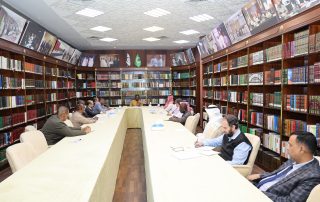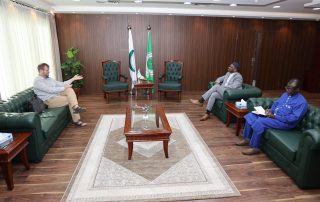
In the Name of Allāh,
the Entirely Merciful, the Especially Merciful
Praise is due to Allāh, Lord of the worlds, may the blessings and peace be upon our master Muḥammad, the last of prophets, on his family, and all his companions.
Resolution No. 208 (4/22) Excommunication of Muslims: Causes, Effects and Remedy
The Council of the International Islamic Fiqh Academy of the Organization of Islamic Cooperation, holding its 22nd session in Kuwait City, State of Kuwait, on 2–5 Jumādā al-Ākhirah 1436h (22–25 March 2015),
Having examined the research papers submitted to the Academy concerning
Excommunication of Muslims: Causes, Effects and Remedy, Having listened to the in-depth discussions on the subject,
Having witnessed this escalating phenomenon of excommunicating Muslims (takfir) and the rush to accuse Muslim individuals, societies, states and govern- ments of apostasy without the slightest regard to the maxims, objectives and principles of Shariah,
Having considered the severe consequences of such ill-founded accusations, including murder, destruction and displacement,
Having presented Shariah-based measures that preserve the entity of the Ummah and protect Muslim societies and individuals from the dangers arising from the accusation of apostasy,
Resolves
First: Confirmation of the Academy resolution no. 152 (1/17) on Islam and the One Ummah: Theological, Jurisprudential, and Educational schools, issued in the 17th Session of the Council, and which indicates impermissibility of charg- ing with disbelief any group that believes in Allāh the Almighty, His Apostle SAW, pillars of Īmān (faith), and pillars of Islam; and does not deny any essensi- ally-known aspect of religion.
Second: Confirmation of resolution no. 175 (1/19) on Freedom of Religion in Shariah: Dimensions and Criteria, which comprises the ruling that fatwā about any case of apostasy or disbelief is an exclusive right of recognized fiqh schol- ars, whereas the judiciary assumes the task of carrying out what these scholars stipulate, besides elimination of suspicions, etc. The same resolution also warns against the dangers that stem from attempts of accusing a specific Muslim sect of apostasy or disbelief, leave alone daring to direct such accusations to com-
panions of the Prophet SAW and virtuous Mothers of Muslims RA, or demean their appreciated status.
Recommendations
Firstly
The Secretariat of the Academy shall finalize the previous recommendations of the Council regarding the organization of seminars and meetings for discussing the following subjects:
- The issue of Walāʾ and Barāʾ (loyalty versus disavowal).
- The ḥadīth of Al-Firqa Al-Najiya (Successful Group).
- Accusing someone of apostasy due to the total non-application of Shariah
Secondly
- Youth of the Ummah to beware of propagandists of perverted thinking and radicalism and seek correct and useful learning through a moderate and well-balanced approach. Youth need to follow the example of the righteous ancestors of the Ummah particularly the companions of the Prophet and their successive devoted
- Scholars and preachers of the Ummah to establish links of communica- tion with youth, discharge their missionary duty, and abide by the mod- erate approach in promoting virtue and prevention of
- States and governments of Muslim countries to provide all possible means and remove obstacles that could jeopardize the process of com- munication between scholars, intellectuals and leaders on the one hand, and youth of the Ummah on the
- Muslim countries to share each other’s success stories in initiating di- alogue with proponents of deviant thoughts; for example, Munasaha (Counseling and Advice) experience of the Kingdom of Saudi Arabia.
Indeed, Allāh is All-Knowing.
Read Also
Lastest








